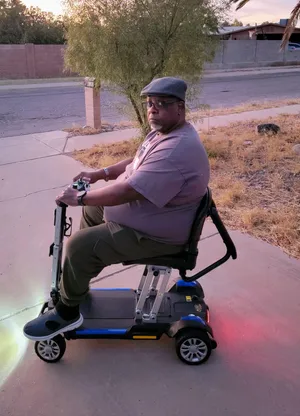Written by Zach Wichter, USA Today, November 7, 2024
When James Davis traveled from his home in Tucson to a family reunion in Pensacola, Florida, via Dallas in July, he only had one major request of American Airlines.
“They informed me that my scooter would be available at each turn. I went from Tucson to Dallas and Dallas to Pensacola, and it was supposed to be available in both,” he said. “I depend on my scooter.”
But despite registering his device with the airline in advance and being told he would have access to his scooter during his layover, the mobility device was checked through to Pensacola instead.
“I was able to get someone to get me a wheelchair so I could get something to eat, drink, so I could take my medication,” Davis said, but added he was still dependent on airport staff to move him around during the layover and to get him to his next flight.
“I was stuck sitting where I’m at,” he said.

On the trip home, from the reunion a few days later, Davis encountered issues with accessing his scooter in Dallas again as it was delayed getting off the plane. He also said he was disappointed that airline staff didn’t offer more assistance as he broke the scooter down to be loaded into the cargo hold.
American Airlines acknowledged the incident in a statement to USA TODAY.
“We know how important it is to support the independence of customers who use wheelchairs and assistive devices. A member of our team has been in contact with the customer to learn more about his experience and address his concerns,” the statement said.
Traveling with mobility devices
Flying can be fraught for people who rely on mobility devices. Airlines damage or destroy 10,000-15,000 wheelchairs and other mobility devices every year, according to Department of Transportation data, and those number do not include issues like the lack of proper accommodation that Davis experienced.
The DOT recently fined American Airlines $50 million for its mishandling of mobility devices and said investigations into similar issues at other airlines are ongoing.
Accessible travel: Delta Air Lines, DOT update plans for adaptive wheelchair seats on future flights
American said that it has been working hard to improve the services it provides to customers with disabilities, including by rolling out an automated bag tag for mobility devices. The airline also said it has seen a decline in the number of mobility device-related complaints from customers in the past year-plus.
Still, Davis said, airlines in general need to work harder at improving in this area.
“I would like to see more compassion,” he said. “Even though I didn’t get my scooter in Dallas on my way, I think the thing that bothered me the most was the flight attendant who stood there and watched me struggle (on my trip home).”
